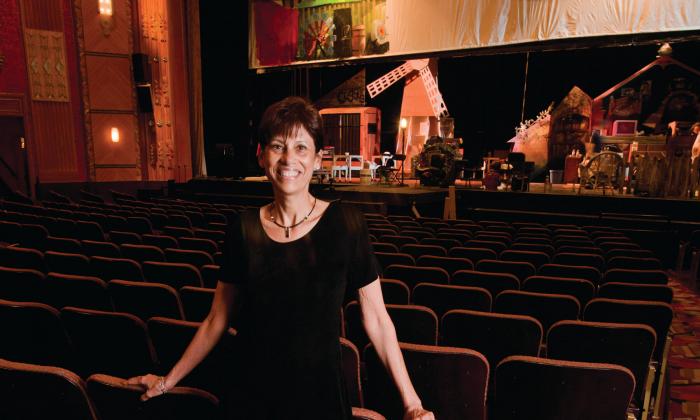
The boy approaches the microphone with a dignified stride. He nods to the cellist seated at center stage and then turns to address the audience that fills the art deco theater.
“Hello, everybody! I’m Darren. How ya doin’ this mornin’?”
Darren grins, a smile too big for his face. The focus of 1,000 pairs of eyes, this second-grader relishes the spotlight. He recites his poem flawlessly, accompanied by the inventive improvisations of the cellist. When he finishes, Darren bows like a seasoned thespian and extends his hand toward the musician. With a wave to the crowd, he makes his way back to a semicircle of folding chairs, where his fellow poets hoot and holler.
All this good feeling takes place late in the 2003-2004 school year at Vogel- Wetmore Elementary in Torrington, Conn. Darren (not his real name) finds joy in this community of fiercely curious children who love to read and write. But this moment is rare for a boy like him—a boy who finds himself in the unlikeliest of circumstances, buoyed by the energy of the crowd in the theater.
Darren, who has a learning disability and physical challenges, is seldom in the spotlight. He can write a few letters and recognize some numbers. His place in space is still a mystery to him. Often an awkward movement or unsteady step sends him careening into others. Part of his day is spent in the resource room. Most of it is in the regular classroom, where he learns the concepts of science and social studies by listening and participating in handson activities.
Much of Darren’s life journey is a struggle.
Darren has a genuine curiosity, and there is no end to his comments and questions. The bends and turns of his mind are bewildering at times. Yet he sports a smile each morning and greets his classmates with enthusiasm. Darren is not just a part of the landscape. He is a dynamic and powerful force in the classroom.
For the school literacy celebration, Darren dictated his poem, illustrated it in his writer’s notebook and presented it to the class. His poem, Sir Darren, has all the elements that intrigue: a knight, a dragon and a princess in distress. And Darren’s love for language makes for a passionate and dramatic delivery. During a classroom visit, professional musician Eugene Friesen (Cello Man) plays dark rhapsodies and pulsing rhythms while Darren recites his poem. There is no doubt that the words and music mesh seamlessly.
On stage, Darren stands front and center, basking in the applause. The experience takes him to another place— a horizon farther than he can see, a healing place without boundaries. This is a historic moment made possible by a principal named William Joslyn. He’s a gentle man whose personal experience led him to promote inclusion for special needs students before mandates spewed from the legislature. He conscientiously helped his staff walk through the minefield of obstacles, recognizing the frustration and confusion that can accompany children challenged by simple routines.
Even ordinary school days can begin with complex problems. The “inclusion model” can quickly twist and morph into a classroom’s worst enemy. A group of special needs students in one room can compromise the quality of instruction. Even with capable instructional assistants, disruptions occur— outbursts, movements, constant low-level conversations, admonitions and questions. Every disability presents its own problems. Each student has a unique set of needs, sometimes compounded by a lack of family support.
Everyone in education has the same goal: to protect the sanctity of the classroom so that all students can learn every day. There is reason to be wary of inclusion because it can alter the way instruction is delivered to the regular education students. It can sap an enormous amount of the teacher’s energy and consume mountains of time.
And yet, inclusion also has moments of glorious joy and unfettered exuberance. The opportunities present in a classroom of eager learners are infinite. Every student has personal challenges, some greater than others. But in a room full of banter and chatter, children gleefully provoke and inspire each other.
Lucky Darren. Today is his day. A principal with conviction sits in the front row, admiring the grace and style of this glorious theater and a boy named Darren. Another knight in shining armor, who just happens to play the cello, joins Darren on stage. Cello Man’s swinging pizzicato and soulful melodies slay the firebreathing dragon.
For Darren, being a part of a community of learners makes a difference in his life. It delivers the unimaginable: a very happily-everafter ending.
Toni Giarnese, now a freelance writer, was a Connecticut educator for 30 years.
Share Your Story
We want to hear what motivates you to get up each morning and serve students in our nation's schools. Send your 600-word submission for the "Why I Teach" column to us here.